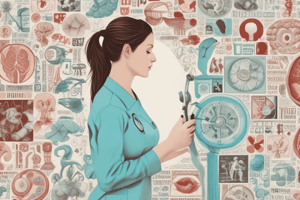Podcast
Questions and Answers
What is one way to check if a person is having a seizure episode?
What is one way to check if a person is having a seizure episode?
- Experiencing elation or fear (correct)
- Feeling a sudden change in temperature
- Loss of muscle strength in both upper extremities
- Not being able to smell anything
Why is it important to document the start time and end time of a seizure?
Why is it important to document the start time and end time of a seizure?
- To calculate the amount of medication needed
- To report the duration to the insurance company
- To determine the need for surgery
- To monitor the frequency of seizures (correct)
What should be assessed regarding the post-seizure status of the patient?
What should be assessed regarding the post-seizure status of the patient?
- Any changes in vision or hearing
- The time it took for the patient to return to pre-seizure status (correct)
- The patient's ability to recall what happened during the seizure
- Any recent surgeries or high fever
What should be done at the completion of a seizure, based on the given document?
What should be done at the completion of a seizure, based on the given document?
Which medication should be monitored for adverse effects as per the document?
Which medication should be monitored for adverse effects as per the document?
What is the recommended action regarding the administration of anti-convulsants after 3-5 years of seizure-free period according to the document?
What is the recommended action regarding the administration of anti-convulsants after 3-5 years of seizure-free period according to the document?
When should vital signs be taken after a seizure episode, based on the given information?
When should vital signs be taken after a seizure episode, based on the given information?
Which part of the neurological examination is primarily concerned with the reflex arc?
Which part of the neurological examination is primarily concerned with the reflex arc?
In the context of neurological examination, which section focuses on assessing cerebellar coordination?
In the context of neurological examination, which section focuses on assessing cerebellar coordination?
Which part of the history taking specifically addresses the frequency of blackout spells or dizziness?
Which part of the history taking specifically addresses the frequency of blackout spells or dizziness?
Which aspect of the demographic history is relevant to the neurological examination?
Which aspect of the demographic history is relevant to the neurological examination?
Flashcards are hidden until you start studying
Study Notes
Seizure Identification and Documentation
- Observing for involuntary movements, unresponsiveness, or abnormal posturing can help identify seizure activity.
- Documenting the start and end times of a seizure is crucial for understanding the duration and frequency, which aids in treatment evaluation.
Post-Seizure Assessment
- Assess the patient's orientation, motor function, and level of consciousness after a seizure to determine recovery status and any potential complications.
Post-Seizure Care
- At the conclusion of a seizure, ensure the patient's safety, provide reassurance, and monitor vital signs closely for any abnormalities.
Medication Monitoring
- Monitor for adverse effects of anti-convulsants, such as sedation or allergic reactions, which can have significant health impacts.
Long-term Management of Seizures
- Discontinuation of anti-convulsants may be considered after a 3-5 year seizure-free period; involve healthcare providers for safe transition.
Vital Sign Monitoring
- Vital signs should be taken regularly after a seizure episode to assess for any postictal changes or complications.
Neurological Examination Components
- The reflex arc is primarily evaluated in the examination of deep tendon reflexes, which assesses the integrity of the nervous system.
Coordination Assessment
- The section of the neurological examination focusing on cerebellar coordination evaluates balance, gait, and fine motor skills.
History Taking
- The history section devoted to reviewing the frequency of blackout spells or dizziness helps identify patterns in neurological events.
Demographic Relevance
- Relevant demographic history, such as age, gender, and family history of neurological disorders, is crucial for comprehensive neurological assessment.
Studying That Suits You
Use AI to generate personalized quizzes and flashcards to suit your learning preferences.




